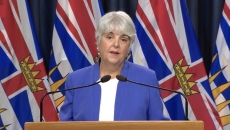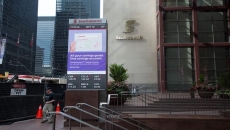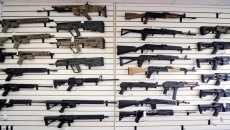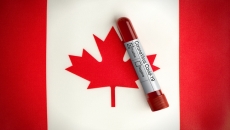Most Ontario regions outside the Toronto area will be allowed to open more businesses and activities Friday, including restaurant patios, hair salons and swimming pools as the province takes a regional approach to reopening.
But provincewide on Friday, the limit on social gatherings will increase from five to 10, while the government says people must still stay two metres away from anyone outside their own household.
Health Minister Christine Elliott said officials have floated the idea of "bubbling," which would let people in two households be in close contact with each other, but the chief medical officer of health doesn't feel Ontario is ready for that yet.
Dr. David Williams said he is "strongly looking at how to go forward with that" and hopes to have news that would apply provincewide later this week.
As well, across Ontario on Friday, all places of worship can reopen as long as attendance is limited to 30 per cent of the building's capacity and physical distancing measures are in place.
Otherwise, current restrictions will stay in place for the Greater Toronto and Hamilton Area, which has a high concentration of the province's COVID-19 cases, border regions such as Windsor-Essex, Lambton County and Niagara and Haldimand-Norfolk, which has seen an outbreak among migrant workers.
"For the regions that must wait a little longer, I ask you: please remain patient," Premier Doug Ford said. "We will get there soon."
For all other areas, Stage 2 on Friday will see restaurants and bars allowed to open patios and other outdoor dining.
The province also announced Monday it will let licensed establishments set up a new patio or expand an existing one without requiring an application or fee.
Tours will be allowed to resume, such as biking, walking, bus and boat tours, along with tastings and tours at wineries, breweries and distilleries.
Some outdoor activities can reopen, such as paintball, mini golf, and go-cart tracks, training for outdoor team sports, camping at private campgrounds, beach access and additional camping at Ontario Parks, splash pads and wading pools, and all swimming pools. Playgrounds won't be open until stage three.
Ford said that people in Stage 1 regions could travel to Stage 2 regions for activities such as camping, but a spokeswoman for Finance Minister Rod Phillips sent a statement shortly after, suggesting the opposite.
"The government urges caution regarding unnecessary travel, especially from higher transmission areas (regions in Stage 1) to lower transmission areas (regions in Stage 2)," Emily Hogeveen wrote.
"In general, people should preferentially stay home and not travel recognizing that there may be limited, essential reasons to do so."
Tattoo parlours, barber shops, hair salons and beauty salons will be allowed to reopen with health and safety measures in place, but not for services for someone's face such as facials, eyebrow grooming and makeup. Steam rooms, saunas and baths must stay closed.
Ford said he would announce a plan Tuesday to reopen child care centres to support parents returning to work.
Stores in malls can reopen, as can photography studios and film and television production with physical distancing protocols, and museums, galleries and zoos can reopen while limiting the number of visitors through measures such as timed entry.
The government is promising to update the public at the beginning of each week on its assessment of whether those regions would be ready to move to Stage 2 by the end of that week.
Elliott said officials are still looking for numbers of new cases to drop, and hospital capacity to continue to increase.
Ontario reported 243 new COVID-19 cases Monday, and 24 more deaths. That brings the province to a total of 30,860 cases — an increase of 0.8 per cent over the previous day, which is the lowest growth rate since early March.
The total includes 2,450 deaths and 24,492 cases that have been resolved.
Ontario also reported another drop in the number of people in hospital — from 635 to 603 — a trend over the past several days. One week ago there were about 800 people in hospital with COVID-19 and at the end of last month it was around 900.
The number of people on ventilators also dropped from 92 to 81, though the number of people in intensive care rose slightly.
Associate chief medical officer of health Dr. Barbara Yaffe said overall the numbers are encouraging. The new case numbers are some of the lowest recorded in a long time, hospitalizations are decreasing steadily, and while testing levels have been ramped up, new case numbers have not risen with them, she said.
Ontario's document laying out Stage 2 details also revealed more about what will be allowed in an eventual Stage 3, including restaurants and bars for dine-in services, performing arts shows and cinemas with limited seating capacity, casinos, gyms, and amusement parks.
Even in Stage 3, the government will recommend remote work continue wherever possible.




.jpg)

